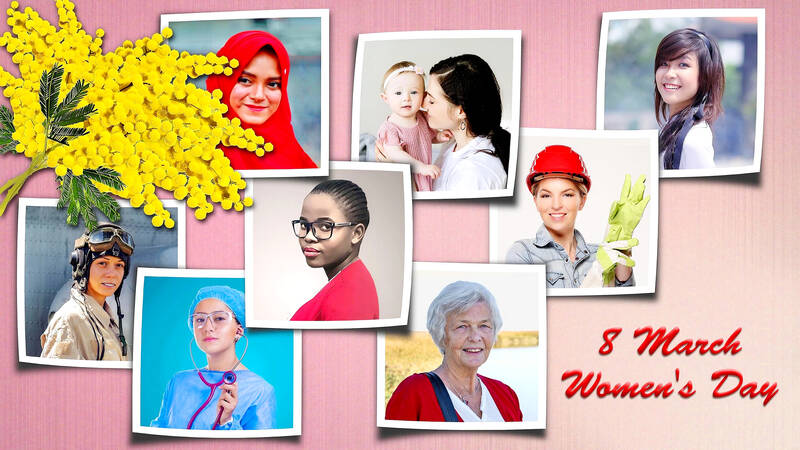對話 Dialogue
清清:唉!像婦女節這麼重要的日子,為什麼剛好就在三八這一天?聽起來很不舒服。
Qīngqing: Āi! Xiàng Fùnǚ jié zhème zhòngyào de rìzǐ, wèishénme gānghǎo jiù zài Sānbā zhè yì tiān? Tīngqǐlái hěn bù shūfú.

Photo: Pixabay 照片:Pixabay 提供
華華:三月八號這個婦女節,是從西方國家來的,西方人哪裡知道中文的「三八」有特別的意思?
Huáhua: Sān yuè bā hào zhège Fùnǚ jié, shì cóng xīfāng guójiā lái de, xīfāng rén nǎlǐ zhīdào Zhōngwén de “Sānbā” yǒu tèbié de yìsi?
清清:其實我也不明白,中文為什麼會用這個詞,來說女人的壞話。
Qīngqing:Qíshí wǒ yě bù míngbái, Zhōngwén wèishénme huì yòng zhèige cí, lái shuō nǚrén de huàihuà.
華華:雖然是壞話,但也是用來形容那些愛八卦、太隨便的女人,這種人本來就很討厭啊!
Huáhua: Suīrán shì huàihuà, dàn yěshì yònglái xíngróng nèixiē ài bāguà, tài suíbiàn de nǚrén, zhè zhǒng rén běnlái jiù hěn tǎoyàn a!
清清:不過有時候我跟好朋友開玩笑,她們罵我三八啦!就不真是壞話了。
Qīngqing: Búguò yǒushíhòu wǒ gēn hǎo péngyǒu kāiwánxiào, tāmen mà wǒ sānbā la, jiù bù zhēnshì huàihuà le.
華華:所以,好好過你的婦女節就好,想那麼多幹嘛?真是三八!
Huáhua: Suǒyǐ, hǎohǎo guò nǐ de Fùnǚ jié jiù hǎo, xiǎng nàme duō gànmá? Zhēnshì sānbā!
清清:看在我們是好朋友的份上,我就不認為你是在說我的壞話了。
Qīngqing: Kànzài wǒmen shì hǎo péngyǒu de fènshàng, wǒ jiù bú rènwéi nǐ shì zài shuō wǒ de huàihuà le.
華華:呵呵呵!那我就先祝「三八」婦女節快樂啦!
Huáhua: Hēhēhē! Nà wǒ jiù xiān zhù “Sānbā” Fùnǚ jié kuàilè la!
翻譯 Translation
Qingqing: Sigh. Why does such an important day like International Women’s Day have to fall on “3/8” (March 8)? The Chinese pronunciation sanba sounds so unpleasant.
Huahua: March 8 International Women’s Day actually comes from Western countries. How would Westerners know that “3/8” has a special meaning in Chinese?
Qingqing: Actually, I don’t really know why Chinese uses this pejorative term when speaking about women.
Huahua: It’s a negative term, but it’s mainly used to describe gossipy or overly flirtatious women. Those kinds of people are annoying anyway.
Qingqing: But sometimes, when I joke around with my good friends and they call me sanba, it doesn’t feel like an insult.Huahua: Exactly. So just enjoy your International Women’s Day and don’t overthink it. Don’t be so “3/8.”
Qingqing: As we’re good friends, I won’t take that as an insult.
Huahua: Haha. I wish my dearest “3/8” a happy Women’s Day!
生詞 Vocabulary
1. 三八 (sānbā) [slang] a gossiping or silly woman
2. 婦女節 ((Fùnǚ jié) Women’s Day
3. 西方 (xīfāng) Western
4. 詞 (cí) word, vocabulary
5. 形容 (xíngróng) describe, characterize
6. 八卦 (bāguà) [slang] gossip
7. 罵 (mà) scold, curse, insult
8. 看在…的份上 ((kànzài. . . de fènshàng) for the sake of. . .
教材音檔 Audio Files
國立清華大學華語中心提供
By National Tsing Hua University Chinese Language Center:

US President Donald Trump on Monday last week signed the TAKE IT DOWN ACT (Tools to Address Known Exploitation by Immobilizing Technological Deepfakes on Websites and Networks Act), bipartisan legislation that enacts stricter penalties for the distribution of non-consensual intimate imagery, sometimes called “revenge porn,” as well as deepfakes created by artificial intelligence. The measure, which goes into effect immediately, was introduced by Sen. Ted Cruz, a Republican from Texas, and Sen. Amy Klobuchar, a Democrat from Minnesota, and later gained the support of First Lady Melania Trump. Critics of the measure, which addresses both real and artificial intelligence-generated imagery, say

Cats ruled in ancient Egypt—and not just in their own minds. These clever, graceful creatures were so deeply respected by the Egyptians that harming one could lead to severe punishment, even death. But why did the Egyptians hold cats in such high regard? It wasn’t just because they were cute; cats played a crucial role in protecting the country’s grain stores from pests. As guardians of Egypt’s food supply, they were seen as sacred animals. The Egyptians honored them through Bastet, the cat-headed goddess of protection, the home and fertility. Egyptians didn’t just love cats; they worshipped them. Cats lived in luxury,

A: Wanna go see a movie during the three-day weekend for the Dragon Boat Festival? B: Sure, I wanna see “Mission: Impossible – The Final Reckoning.” A: Rumor has it that this may be actor Tom Cruise’s last mission with the Mission: Impossible action movie franchise. B: Tom was only 34 when the first installment of the series was released in 1996. Now, he’s 63 and the eighth installment is out. A: I hope he’ll stay with the series. Let’s go see him fight against AI this weekend. A: 端午節三天連假週末要不要去看電影? B: 好啊我想看 《不可能的任務:最終清算》! A: 這有可能是湯姆克魯斯最後一次為動作片《不可能》系列出任務。 B:

Continued from yesterday(延續自昨日) https://www.taipeitimes.com/News/lang Despite these advantages, there are still some challenges when it comes to housing data centers under the ocean. One problem is that they’re difficult to access for repair or replacement. __4__ This presents a significantly higher level of complexity than handling traditional land-based data centers. Another challenge is energy reliability. Many underwater data centers rely on offshore renewable energy sources, which can be unstable due to environmental factors. While underwater data centers offer exciting possibilities, overcoming the associated challenges is essential to realizing their full potential. 儘管有這些優勢,在海底安置資料中心仍存在一些難關。一個問題是難以進入水下資料中心進行修理或更換。這需要派人員到水下或將資料中心運送到維修站。這比處理傳統的陸上資料中心還要複雜許多。另一個難關是能源可靠性。許多水下資料中心依賴近海再生能源,而這些能源可能會因環境因素而不穩定。雖然水下資料中心提供了令人興奮的可能性,但要充分發揮其潛力,克服相關的難題是相當重要的。 What Did You Learn? (A) However, the expense of housing and maintaining the facilities